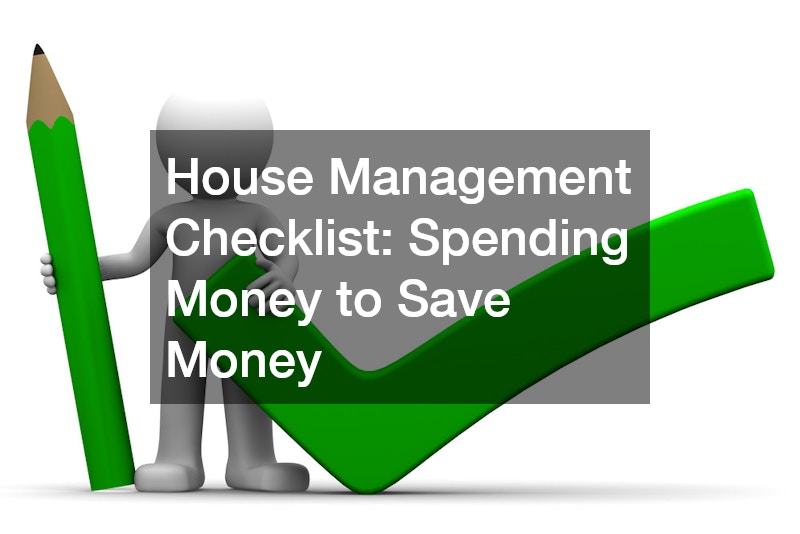
Managing a home efficiently requires more than just routine cleaning and upkeep; it demands a structured approach that maximizes your investments while minimizing expenditures. A comprehensive house management checklist is essential to identify critical maintenance tasks, integrate energy efficiencies, and ensure that preventative measures are in place. By systematically evaluating various elements of the home, you can prioritize projects that not only enhance the longevity of your property but also optimize its resale value.
1. Why is a House Management Checklist Important?
A house management checklist is crucial for maintaining the value of your home and ensuring its systems operate efficiently. When tasks such as chimney cleaning, septic system maintenance, and overhead door repair are scheduled and completed regularly, they provide peace of mind to homeowners. Regularly updating this checklist helps prevent small issues from escalating into major repairs that could be budget-breaking.
Moreover, a well-structured checklist encourages homeowners to stay proactive rather than reactive. It allows homeowners to forecast expenses associated with maintenance and repairs, making budgeting more manageable. By identifying long-term projects such as masonry work or installing a vented roof, homeowners can save money and enhance the home’s structural integrity.
In short, a house management checklist acts as both a roadmap and a safety net, guiding homeowners through the various essential tasks required to maintain their property. This framework can also be adapted as homes undergo renovations or as homeowners upgrade systems, like installing energy-efficient solar panels. Thus, a strategic checklist contributes significantly to property management by laying out critical tasks that can lead to remarkable financial benefits.

2. What are the Essential Items for a House Management Checklist?
Every effective house management checklist should include a range of essential items that cover all aspects of home maintenance. Items like roof inspections should not be overlooked—especially for identifying issues related to waterproofing or ensuring a vented roof is functioning properly. Additionally, regular inspections of the septic system are vital, as neglecting these can lead to severe and costly problems.
Another essential component is seasonal tasks, such as chimney cleaning in fall to prepare for winter heating. This not only boosts safety but also contributes to the overall efficiency of your home. Equally important is having the contact information for services like overhead door repair and sealcoating services readily available, so you can address issues swiftly as they arise.
A detailed house management checklist will also encompass cosmetic and aesthetic elements. For instance, regular maintenance on the deck drainage system ensures that water does not accumulate and cause damage. Keeping an eye on these various aspects of home care contributes not only to the livability of your home but also enhances its market value over time.
3. How Can Preventive Maintenance Save Money?
Preventive maintenance is often likened to an insurance policy for your home—it may require upfront investment, but it saves you from larger costs later on. By routinely maintaining aspects of your home like masonry and waterproofing, homeowners can significantly reduce the risks of emergency repairs that can emerge from neglect. Tasks like gutter cleaning, checking seals, and regular HVAC inspections can catch problems before they develop into more serious, expensive issues.
For example, a poorly maintained roof could lead to major leaks and damage, necessitating significant repairs or even full roof replacement. Investing in regular chimney cleaning ensures the fireplace is functional and reduces the risk of fire hazards. Likewise, scheduling the installation of a whole home surge protector can protect valuable electronics from damage and save on replacement costs.
Integrating preventive maintenance into your house management checklist also allows for better financial planning. By forecasting costs for various maintenance tasks and setting aside a budget annually, you can avoid financial shocks and ensure all aspects of your home are maintained. All of this contributes to an overall strategy that exemplifies foresight and wisdom in managing household expenses.
4. Is Energy Efficiency Worth the Investment?
When weighing home improvement options, energy efficiency should be a top consideration because it pays dividends over time. Installing features like solar panels or enhancing insulation in walls can significantly reduce monthly utility bills, resulting in substantial long-term savings. Energy-efficient systems improve comfort and add to your property value, making these upgrades financially sound choices.
It’s also worth exploring energy-efficient appliances that can complement any upgrades you initiate. For instance, modern systems often consume much less energy, leading to further cost reductions. The cumulative effect of these proactive upgrades can keep your house management checklist focused on improvements that benefit both the environment and your wallet.
Additionally, many local governments offer incentives for homeowners who implement energy-efficient measures. These incentives can help offset initial costs related to solar panel reinstallation or the installation of energy-efficient heating and cooling systems. Overall, these upgrades not only conserve resources but often lead to modern homes that are cheaper to maintain and operate.

5. What Are the Benefits of Professional Cleaning Services?
Investing in professional cleaning services can drastically improve the maintenance of your home while saving you time and potentially reducing costs. Services such as deep cleaning for carpets or specialized chimney cleaning, which requires professional equipment, help maintain a healthier living environment. By outsourcing these tasks, you can focus on other home management checklist responsibilities such as budgeting for larger projects.
Moreover, professional cleaning services can often identify issues that might go unnoticed by the untrained eye. For example, a qualified cleaning technician might spot early signs of mold during a thorough cleaning session, allowing for timely intervention before the problem grows. This proactive approach can lead to significant savings, as remediation is often much less expensive than dealing with the fallout of extensive damage.
Another advantage is the emotional comfort that comes from a clean and organized living space. A tidy environment reduces stress and enhances productivity, allowing families to enjoy time spent at home more fully. Therefore, including professional cleaning services in your house management checklist is about more than just clean surfaces—it’s a step towards creating a healthier and more balanced home life.
6. How to Manage Landscaping to Save Money?
Landscaping is not only about aesthetics; it plays a significant role in the overall management of your home’s functionality and value. Implementing efficient irrigation systems and choosing native plants can drastically reduce water costs. In addition, using mulch and proper waste management techniques can minimize the need for chemical treatments, making landscaping both eco-friendly and cost-effective.
Incorporating features like trees to shade your home can also lead to lower cooling costs in the summer months. Understanding how to manage landscaping tasks (such as periodic pruning and seasonal plant replacement) can prevent the need for expensive replacements. Moreover, establishing a well-functioning deck drainage system will ensure that conditions are optimal for plants, significantly reducing maintenance costs and enhancing their longevity.
It’s also wise to consider bulk purchasing for landscaping supplies, whether it’s mulch, stone, or plants. This strategic approach can save money and prevent frequent trips to the supply store, reducing overall expenses related to upkeep. Ultimately, landscaping management isn’t just about creating curb appeal; it’s a crucial part of your house management checklist that contributes to both financial savings and property value.

7. Are Home Warranties a Good Investment?
Home warranties offer homeowners peace of mind and can be a sound investment under the right conditions. These warranties typically cover several systems and appliances, providing a safety net should these critical items fail unexpectedly. By investing in a home warranty, homeowners can mitigate the risk of paying out-of-pocket for expensive repairs related to their septic system, HVAC, or major appliances.
One significant advantage is that many home warranties offer coverage for issues that standard homeowners insurance may not, providing broader protection. This can often include specialized services like chimney cleaning, ensuring that all aspects of home maintenance are accounted for. Home warranties can also save time and energy, as they typically provide access to a network of vetted contractors for repairs and maintenance.
8. How to Strategically Use Coupons and Discounts?
Coupons and discounts provide an excellent means to save money on both routine maintenance and significant repairs. Many reputable companies offer seasonal promotions for services such as sealcoating, chimney cleaning, or even landscaping. By staying vigilant about these opportunities, homeowners can stretch their budgets further, allowing for a more comprehensive approach to their house management checklist.
It’s also wise to combine coupons with other savings strategies, such as bulk purchasing. If you’re scheduling multiple services (for instance, getting your septic system checked while also addressing chimney cleaning), you can often negotiate better deals. Additionally, many provide discounts for loyalty or for first-time clients, making it beneficial to explore various service providers ahead of time.
Integrating strategic coupon use into your house management checklist not only leads to immediate savings but can also promote a more consistent maintenance schedule. This leads to sustainable home management practices that save money in the long run. Thus, being proactive about discounts can transform ordinary vs. extraordinary expenses into manageable investments.
9. Should You Consider Home Automation?
Home automation systems offer cutting-edge solutions to enhance energy efficiency, security, and overall comfort in your living space. By incorporating smart technology into your home, you can monitor and control systems such as heating, lighting, and even the security of your chimney. These innovations help homeowners make informed decisions, driving down energy costs while facilitating easier management of household tasks.
Additionally, smart systems can alert you to issues before they escalate—like leaks in plumbing or unusual energy usage that could indicate the need for repairs on systems like the HVAC or septic system. These features not only extend the life of essential systems but also provide savings that can be accounted for in your house management checklist. You might find that initial investments will quickly return dividends in operational efficiencies.
Moreover, if you’re considering solar panel reinstallation or significant renovations, smart home technology can complement these efforts by optimizing energy consumption effectively. As homes increasingly adapt to modern needs, implementing automation enhances functionality and can contribute to an exciting living experience. Thus, evaluating home automation as part of your house management checklist invites a new level of convenience and sustainability.

10. How Can Bulk Purchasing Save You Money?
Bulk purchasing is an effective strategy for homeowners looking to save on essential services and maintenance supplies. Whether it’s buying paint, mulch for the garden, or even supplies for routine repairs, buying in larger quantities often leads to discounts that wouldn’t be available with smaller purchases. It simplifies the process, ensures you always have the required materials on hand, and helps prevent last-minute, potentially more costly shopping trips.
In addition to materials, bulk purchases can extend to contracting services. For example, if you schedule multiple services like chimney cleaning, waterproofing, or overhead door repair at once, many companies will offer bundled pricing. This not only cuts down on your costs but also streamlines your house management checklist, allowing for more efficient scheduling of essential maintenance.
Moreover, it’s wise to coordinate bulk purchases with seasonal needs to prevent running out. For instance, if you know that you will need sealcoating services in the summer, securing those supplies in advance can help set your maintenance schedule and prevent delays. Truly, bulk purchasing is an intelligent tactic for sustaining your home while managing costs effectively over time.
11. What are the Best Practices for Pest Control?
Effective pest control is a vital part of home maintenance that should be included in your house management checklist to prevent costly damage. Regular inspections and early detection of pest issues can save homeowners from extensive extermination costs down the line. Implementing methods such as sealing cracks, maintaining clean outdoor areas, and proper waste management can significantly reduce pest infestations.
Utilizing professional pest control services is another best practice, as these specialists have the experience and tools necessary to handle various pest issues. Many companies offer comprehensive plans that protect against seasonal pests and can even identify underlying issues you may not see, such as insufficient waterproofing that invites termites. Hiring professionals can result in thorough treatments, ensuring that issues are effectively eradicated before they multiply into larger problems.
Lastly, ongoing education about pest control is important. Homeowners should familiarize themselves with potential signs of pest activity that can lead to broader infestations. By integrating pest control practices into your overall house management checklist, you can maintain a healthier and more manageable home environment while minimizing unexpected costs.
Conclusion
Maintaining a comprehensive house management checklist is essential for any homeowner looking to maximize their investment. By integrating preventive maintenance practices and investing wisely in energy efficiency, owners can significantly improve their home’s value while curbing expenses in the long term. Each element discussed—from proactive pest control to careful management of landscaping—contributes to a sustainable, efficient lifestyle that pays dividends down the line. Harness the power of your house management checklist and begin your journey toward a more efficient, cost-effective home today!


